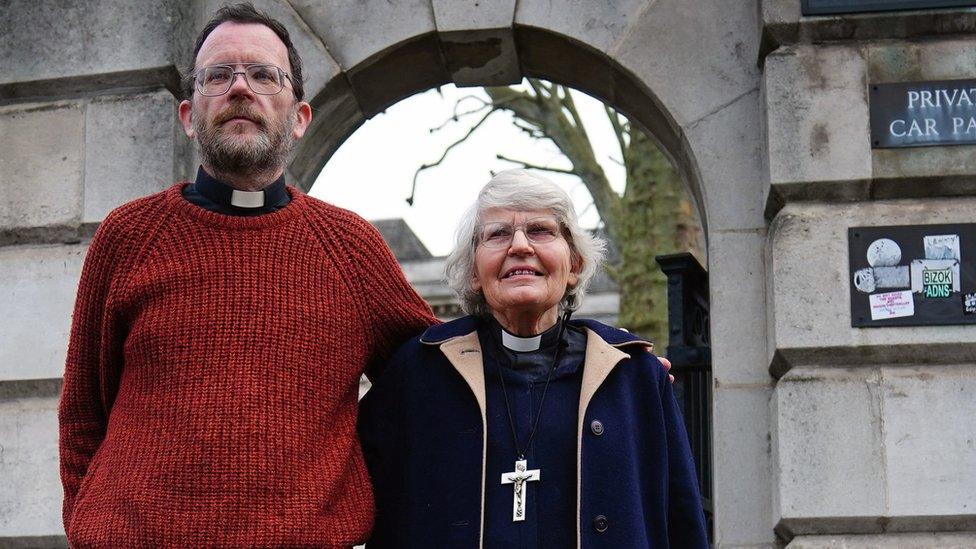Christian train activists went too far in climate protest, court hears
- Published

Father Martin Newell and the Reverend Sue Parfitt deny charges of obstructing an engine or carriage on the railway
Three Christian environmentalists "went too far" in their climate change protest by stopping a busy train, a court has heard.
Passengers begged the Reverend Sue Parfitt, 79, Father Martin Newell, 54, and Philip Kingston, 85, to move from the rush-hour train at east London's Shadwell station in October 2019.
The trio refused until police officers arrived.
They had to unstick Mr Kingston after he glued himself to the locomotive.
Inner London Crown Court was told that Ms Parfitt, from Bristol, and Mr Newell, from Birmingham, used a ladder to climb on the train roof while Mr Kingston, from South Gloucestershire, superglued himself to the side of the carriage.
Prosecution barrister Edmund Blackman told the jury that although the three had the "precious right" to protest, in this case they went too far.
The train was travelling from Lewisham to Bank shortly before 07:00 and was about three-quarters full.
The protest caused more than an hour of disruption and 15 Docklands Light Railway (DLR) services were delayed or cancelled.
The protesters, who are members of Christian Climate Action, an arm of Extinction Rebellion, deny charges of obstructing an engine or carriage on the railway.
The jury heard that a passenger pleaded "we have got to go to work, the kids are on the train and we have got to go to school".
In response, Mr Newell said he was "sorry", adding: "But this is what we have to resort to", as he refused calls from members of the public to come down.
Mr Blackman said the protesters had arrived at the station at about 06:45 and "acting in concert" had intended to cause rush-hour disruption.
These protesters "deliberately acted unlawfully" at a busy time of time of day with a demonstration aimed at "attracting attention" to the climate change crisis, he added.
British Transport Police Supt Richard Twyford said that any such protests could lead to safety risks such as congestion and crush hazards, and could force people to be evacuated.
The jury heard that some passengers told the environmentalists that the train they targeted was an electric train and should therefore not be the focus of the protest, while another commuter asked: "How did you get to the station, did you walk here? Obviously you got here by a train or bus," the court was told.
The trial continues.